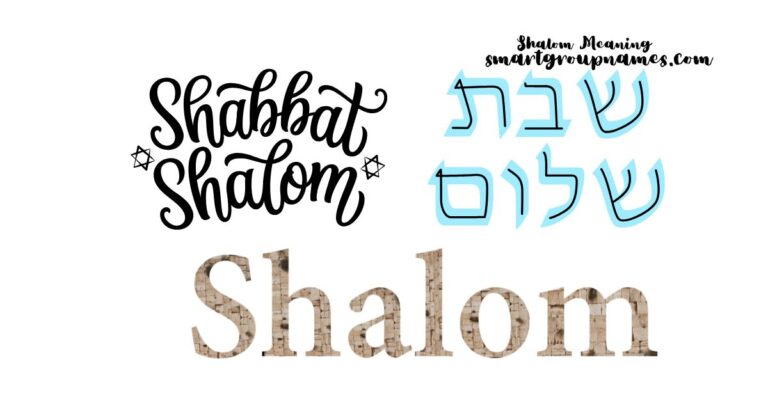When someone says “Shalom,” you might think they’re just saying hello or goodbye in Hebrew. But dig a little deeper, and you’ll find that this ancient word carries layers of meaning far beyond a simple greeting. The meaning of Shalom goes into the very heart of peace, wholeness, harmony, and spiritual well-being — not only in the Hebrew language but also in Jewish tradition and beyond.
Let’s explore what “Shalom” truly means and why this single word holds such powerful cultural and spiritual significance.
What Does Shalom Mean?
Shalom (שָׁלוֹם) is a Hebrew word derived from the root sh-l-m (ש-ל-ם), which means completeness, soundness, or well-being. While it’s commonly translated as “peace,” the word encompasses much more, suggesting wholeness, balance, and even prosperity.
In Hebrew, peace is not just the absence of war or conflict. Shalom is about a state of being whole and undivided, both physically and spiritually.
Shalom in Jewish Culture and Religion

In Jewish life, “Shalom” is both a greeting and a blessing. People say “Shalom Aleichem” (Peace be upon you) when they meet, and the reply is “Aleichem Shalom.” On the Sabbath, the phrase “Shabbat Shalom” is commonly used, wishing others a peaceful and restful day of spiritual reflection.
The importance of peace in Judaism goes far beyond custom. Jewish texts like the Torah and Talmud elevate Shalom as one of the greatest values, something even more important than truth or justice in certain cases. The word appears hundreds of times in Jewish prayers, blessings, and rituals, reinforcing the idea that peace is central to a righteous life.
The Deeper Spiritual Meaning of Shalom
While Shalom is used in everyday language, its spiritual significance is profound. It refers to inner peace, emotional balance, and a sense of divine completeness. In this way, Shalom represents the ideal state of harmony between humans, nature, and God.
According to Jewish mysticism and teachings, living in Shalom means being in alignment with your purpose, your community, and your Creator. It’s a kind of spiritual well-being that goes beyond personal contentment, it’s the condition of the soul at peace with the world.
Shalom in the Bible
The concept of Shalom is deeply embedded in the Old Testament. In the Book of Isaiah, the Messiah is referred to as the “Prince of Peace.” In Psalms, we find countless prayers for peace in Jerusalem. The Priestly Blessing in Numbers 6:26 ends with the words:
“May the Lord lift up His countenance upon you and give you peace (shalom).”
Biblical Shalom is not just about political peace, but about the full restoration of justice, prosperity, and spiritual balance in society.
How Shalom Is Used Today
Today, Shalom is still used widely in Israel and Jewish communities worldwide. Whether you’re walking into a synagogue, calling a friend, or leaving a family gathering, saying “Shalom” is a common practice.
Beyond its traditional uses, Shalom is also found in modern contexts such as:
- “Shalom Bayit” – peace in the home, especially between spouses.
- Peace organizations that promote interfaith and intercultural understanding using the word “Shalom” in their names.
- Jewish art, music, and literature that celebrate shalom as a universal ideal.
Shalom in Other Religions and Cultures
The idea of peace is not exclusive to Judaism. In Islam, the greeting “As-Salaam-Alaikum” is directly related to the Arabic word Salaam, which shares the same root as Shalom. In Christianity, phrases like “Peace be with you” echo the same spiritual message.
This shared language of peace reminds us of a deeper interfaith connection between the Abrahamic religions — all of which emphasize peace as a divine and moral ideal.
Why Understanding the Meaning of Shalom Matters
In a world filled with conflict, stress, and noise, understanding the meaning of Shalom can be a powerful reminder of what truly matters: balance, healing, and connection.
Whether you’re religious or not, embracing the values of Shalom — inner peace, mutual respect, and wholeness — can transform your relationships, your mindset, and even your community.
Frequently Asked Questions (FAQ)
Q: Is Shalom only used by Jews?
No. While “Shalom” is a central concept in Judaism, it is understood and used by people of various faiths and backgrounds interested in Hebrew or Jewish culture.
Q: Can non-Jews say Shalom?
Absolutely! Saying “Shalom” respectfully is a great way to connect across cultures and share in the spirit of peace.
Q: Is Shalom the same as Salaam?
They share the same Semitic root and both mean “peace,” though they are used in different religious and cultural contexts.
Q: What’s the difference between Shalom and Peace?
“Peace” in English usually refers to the absence of conflict. Shalom includes peace but goes deeper, meaning wholeness, health, and spiritual completeness.
Conclusion
“Shalom” isn’t just a word, it’s a way of living. From ancient Hebrew scripture to modern conversations, it calls us to seek harmony, embrace spiritual well-being, and extend peace to everyone we meet.
So the next time you say “Shalom,” know that you’re not just greeting someone, you’re offering them a wish for wholeness, completeness, and divine peace.

JCK Smith is a seasoned writer specializing in the names niche, helping individuals and businesses find the perfect names for groups, teams, brands, and more. With years of experience in creative naming, JCK blends originality with strategic SEO to craft lists that rank high on search engines and provide real value to users.











